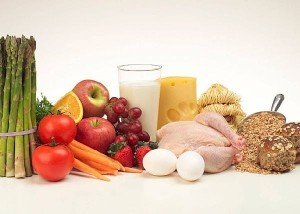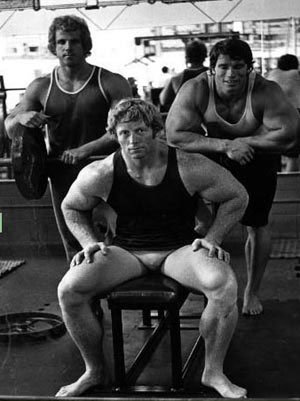>
NO – to nutrition supplements and YES – to healty food
No food supplement can make initially incorrect workout efficient. That’s why the majority of highly advertised food supplements are simply useless. If your combination of training, natural food and rest is unsuccessful don’t believe that any food supplement can improve it. Most probably, the problem is that you either train, or eat or rest improperly. Find the reason of your failure and get rid of it; only then you’ll be able to ‘grow’ and only then it will be reasonable to experiment with food supplements.
A lot of beginners firmly believe that their muscles start growing as soon as they start taking one or another food supplement. When they don’t see any growth they direct all their enthusiasm not to organization of correct trainings and nutrition but to experiments with another ‘miracle’. They simply don’t understand that any food supplement is useless without considered training, balanced nutrition and full-fledged rest.
An average beginner is able to achieve fantastic results absolutely without any supplements (we are not talking about vitamins and minerals). So, you need to understand that the reason of absence of progress lies only in mistakes in either training, or nutrition or rest. And supplements have nothing to do with it.
We need to ask ourselves a frank question: does an athlete really need lots of food supplements; what real good do they do? Let’s take a closer look at the whole plenty of food supplements in order to examine this problem more thoroughly.
proteins,
‘gainers’ and energy drinks,
vitamins and minerals,
pro-hormones and
other supplements
1. A bodybuilder requires 1-2 gr of proteins per each pound of his body weight; and this is much more in comparison with protein necessity of a usual person. In case it’s impossible to receive daily protein norm from natural food or when there’s no possibility to have a full-fledged meal it’s reasonable to get missing proteins from a protein cocktail (‘food substitute’). But still, protein cocktails are only addition to natural proteinic food.
2. The main advantage of amino acids is that they get to our blood much sooner than proteinic food, digestion of which takes time. There are two main moments when it’s reasonable to use such supplements: in the morning after waking up and right after a training session because these are the periods when our organism needs getting constructive material (amino acids) in the quickest way.
3. ‘Gainers’ and energy drinks can really help increase body weight but the problem is that the major part of this weight can turn into fat because it’s not simple to use that large amount of energy they carry appropriately. If you decided to use these supplements the best time is right after a training session
4. It would be stupid to argue about the necessity of taking additional doses of vitamins and minerals. It’s a well-known fact that a bodybuilder requires increased regular vitamin doses (especially vitamins of C, E and group B); and it’s not always possible to receive the necessary dose of these substances from natural food.
5. The situation with fat burners is very tangled: the majority of advertised fat burners appear to be absolute rubbish produced to swindle unsuspecting consumers out of their money… Only those fat-burning supplements that contain ephedrine (in one or another form) proved to be really useful.
6. Creatine monohydrate can really help some athletes (and sometimes very significantly) increase their muscle size and strength. Still, you shouldn’t forget that for each third person Creatine will be nothing else but wasted money. You can find out which part you belong only by trying to use it; that’s why it would be reasonable to try the effect of creatine at least once. The best time for such experiment would be the period of working with the heaviest loads.
7. Pro-hormones are not that popular nowadays than they used to be: it’s because they were recognized as doping and were prohibited by professional bodybuilding associations.
8. Other nutrition supplements: this is the biggest supplement group that constitutes approximately half of all supplement products proposed by world market nowadays. Here we can find all products that don’t belong to the groups mentioned above: shark’s cartilage, cat’s-claw, vanadium, collagen, G-Factor, Pro-h, GH, Ginkgo Biloba, Saw Palmeto, and many others. I put them all into the same group because they are absolutely useless: no changes occur when the absolute majority of athletes take them…
As you can see, some of the described supplements can help you to ‘optimize’ your diet what means that they can make up for deficit of required nutrients and other substances. At the same time, if you can balance your ration only by means of natural products, it’s not necessary to take additional surrogate substitutes (with the exception of vitamins because it’s difficult to receive enough of them from natural food).
Nutrition Supplement sale is a business and like other types of business it’s totally insincere and hypocritical. Those athletes whose bodies we can see at food supplement posters can even take the products they advertise; but even if they do it, the consumed quantity of one or another food supplement is not significant. It appears to be only a small addition to a certain ‘champion formula’ that’s actually not a big secret. Still, due to current tradition, supplement producers don’t tend to voice it. From the fist glance, it’s rather simple: growth hormone + insulin + steroids + minor supplements (thyroids, clenbuterol, antiestrogens, diuretics, etc.). You should never believe a bodybuilder who won a serious competition and keeps saying that he had never used any products mentioned above but became such massive and buffed only due to food supplements.
If your training emphases are correct, rational use of food supplements can increase your muscle growth (I repeat: in case your training program is productive). But if you have problems with your training and recovery process, food supplements will bring you nothing but malice and disappointment (oh well, one more ‘miracle’ didn’t work!).
| Items | Purpose | Dosage |
| Powder proteins | Diet ‘optimization’,Addition to natural food | The dose is defined sothat the daily ration protein quantity is no less than 1-2gr per 1 pound of body weight |
| Amino acids | Diet ‘optimization’,better digestion,muscle mass maintenanceduring ‘fat burn’ period | In accordance with the supplement instructions |
| Vitamin and mineral | Metabolism catalysts | In accordance with the instructions –in case of special sport drugs;double dose – in case of ordinarydrug-store complexes |
| Creatine | Increase of strength andmuscle size | 5 days of ‘charging’ phase:20-30gr in 4-6 intakes each day;after it – 5rg a day.Should be taken together withsimple carbohydrates(best of all – with grape juice) |
| Ephedrine supplements | Fat burning, raising of general energy level of our organism | In accordance with the instructions (usually 3 times a day) |
LIST OF SUPPLEMENTS
Protein
Daily norm: approximately 1-2 gr of protein per pound of body weight
Periodization: not required
Intake time: eat 5-6 times a day and take 20-40gr of protein with each food intake; it’s better to take it together with carbohydrates (it simplifies protein assimilation). Increase protein amount and reduce carbohydrate amount in your ration in the evening.
Note: don’t believe the ‘fairy-tale’ that your organism can assimilate only 30gr of proteins because their assimilation depends on the state of your organism and its needs.
Amino acids
Daily norm: 5-50rg
Periodization: not required
Intake time: take BCAA before, after and even during trainings. Take complex amino acids in small portions throughout the day and especially in the morning.
Note: don’t substitute natural food for amino acids. Remember: they are just an addition to adjust your everyday protein profile.
Creatine monohydrate
Daily norm: 20gr (5gr 4 times a day) during the first 5 days; then – 5gr a day during two months.
Periodization: 2-3 months with kreatine – one month without.
Intake time: when it’s convenient for you since there are no special medical indications regarding kreatine taking. It’s better to take it together with simple carbohydrates: this can be done before and right after trainings.
Note: it’s not advisable to drink coffee when taking this supplement.
Glutamine
Daily norm: 5-20gr
Periodization: there are no indications regarding its taking; still, it’s recommended to increase glutamine dose in case of hard training loads.
Intake time: when it’s convenient. I personally take glutamine before going to sleep.
Note: normal glutamine level is especially important for working muscles. Don’t forget to take it regularly!
Poly vitamins
Daily norm: choose those complexes that guarantee you 100% of your daily need in vitamins B, C, E and minerals; one tablet in the morning, the other – before going to sleep.
Periodization: not required
Intake time: when it’s convenient
Note: remember that polyvitamins guarantee assimilation of proteins and carbohydrates and shield you from diseases.
source:gymper.com
Tags: Amino acids, Creatine Monohydrate, Glutamine, Poly vitamins, Protein, Supplement
This entry was posted
on Wednesday, June 2nd, 2010 at 6:16 pm and is filed under NUTRITION.
You can follow any responses to this entry through the RSS 2.0 feed.
You can leave a response, or trackback from your own site.

